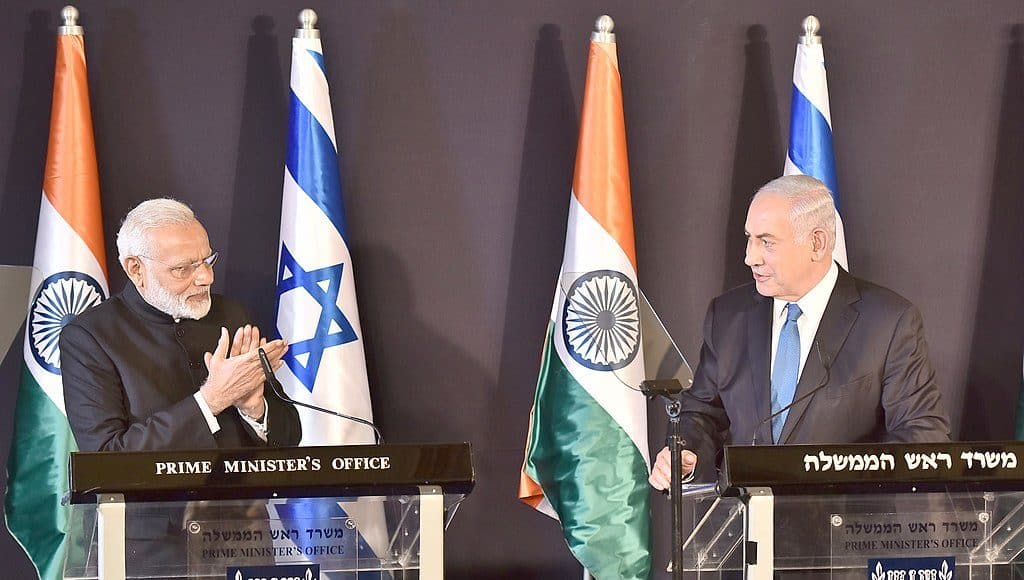India has historically pursued a pro-Palestinian foreign policy, before the pro-Hindutva government of Narendra Modi came to power in 2014. Leaders of the Indian independence movement understood the Palestinian movement as a fellow struggle against British imperialism. Mahatma Gandhi wrote in 1938 in his magazine Harijan ‘Palestine belongs to the Arabs in the same sense that England belongs to the English, or France to the French.’ Indian support for Palestine started right after it became independent from British rule: India voted against the partition of Palestine in 1947 and did not recognise the creation of the state of Israel in 1948, despite Albert Einstein’s request for the same in a letter to the first Indian Prime Minister Jawaharlal Nehru. India also voted against Israel’s admission to the UN in 1949. Many Indian leaders saw the similarities between Israel and Pakistan as two nation states created by the British on the basis of religion. However, as a practical move India did recognise Israel in 1950.
Over the decades, India built strong ties with Palestine, being the first non-Arab State aside from Cuba to recognise the Palestine Liberation Organisation (PLO) in 1974 with a PLO office set up in New Delhi in 1975. In 1988, India recognised the statehood of Palestine. It also set up a representative office in Gaza in 1996, later moved to Ramallah. Various governments of India have consistently voted in favour of Palestinian statehood at the UN and supported and participated in various peace and donor conferences.
This pro-Palestine stance has been shifting, due to the rise of nationalist right-wing Hindutva forces in India. Hindu nationalists have long supported Israel and Zionism, partly based on their mutual animosity to Islam. Veer Savarkar, the earliest and biggest Hindutva icon and leader of Hindu Mahasabha, an early Hindu nationalist party, before it became Rashtriya Swayamsevak Sangh (RSS), now a far-right paramilitary organisation, supported the creation of Israel and opposed the then Indian government’s stance to not recognise its creation in 1948. Hindu nationalist and fascist early RSS leader MS Golwalkar admired Israel and Jewish nationalism after the creation of Israel. RSS leaders have also admired Hitler and Mussolini, especially BS Moonje who visited Mussolini in 1931 and sought to build up the RSS, with its militaristic dress code and early morning exercises with lathis, in the model of Italian fascism.
After the election of Narendra Modi of the right-wing Hindu Nationalist BJP as India’s PM in 2014 and his two subsequent electoral wins, Indian foreign policy took a markedly pro-Israel turn. Indian arms cooperation with Israel has risen manifold under Modi’s rule, with India becoming the largest buyer of Israeli weapons, including drones, anti-tank missiles, Phalcon AWACS, and other hi tech weaponry and technology comprising 42.1% of Israeli arms exports since 2014. India also signed an agreement with Israel to send thousands of skilled construction workers to replace Palestinian labour in 2023 and 2024. India is also said to be exporting weapons to Israel for use in Gaza, with a cargo vessel containing arms of Indian origin blocked from landing in a Spanish port en route to Ashdod in May, although the Indian government has denied it.
India’s UN voting patterns have also mostly shifted from their traditional pro-Palestine record, with India abstaining in April 2024 from voting for an arms embargo on Israel, abstaining in September 2024 from the UN resolution demanding Israel withdraw from its unlawful presence in Palestine within 12 months, and abstaining from condemning Israel’s ban on the UN chief in October 2024. However, at times India has voted in favour of Palestine, such as in May 2024 for full Palestinian membership of the UN. India has also continued its relations with Palestine, although in a downgraded form, with Modi being conferred Grand Collar of the State of Palestine by collaborationist Palestinian Authority President Mahmoud Abbas in 2018 during a state visit.
Modi’s Hindutva supporters on Twitter (X) and elsewhere, by and large now openly back Israel, especially after the events of 7 October 2023. They see parallels between attacks on Israel and terrorist attacks in India such as the parliament attack in 2001 and Mumbai terror attack in 2008. In fact, they often hold Israel as a successful model to deal with Muslims and seek to create India as a Hindu version of Israel, especially in Kashmir. For example, in June 2024, a prominent right-wing political commentator, Anand Ranganathan, made comments supporting an Israel-like solution in Kashmir, promoting settlements of Hindus similar to the illegal settlements Israel has created in West bank.
Yogi Adityanath, a right-wing Hindutva firebrand and BJP chief minister of Uttar Pradesh state, started the practice in 2017 of demolishing the houses of mostly Muslim protesters against government policies, directly borrowing from Israel’s corresponding policy in the West Bank, in what has been termed the Bulldozer Raj. Now this practice has become mainstream in other BJP-ruled states in India, including Madhya Pradesh and Rajasthan, even though India’s supreme court recently gave a strong opinion against the practice of bulldozing the houses of accused rather than following the proper procedures laid down in Indian law.
India under the Modi government has significantly changed its traditional pro-Palestine foreign policy in favour of closer ties with Israel, especially in the defence sector. This is driven partly by ideology, with Hindu nationalist supporters of Modi’s party rallying in support of Israel and holding it as a model for dealing with India’s Muslims.
Jay Hussain




